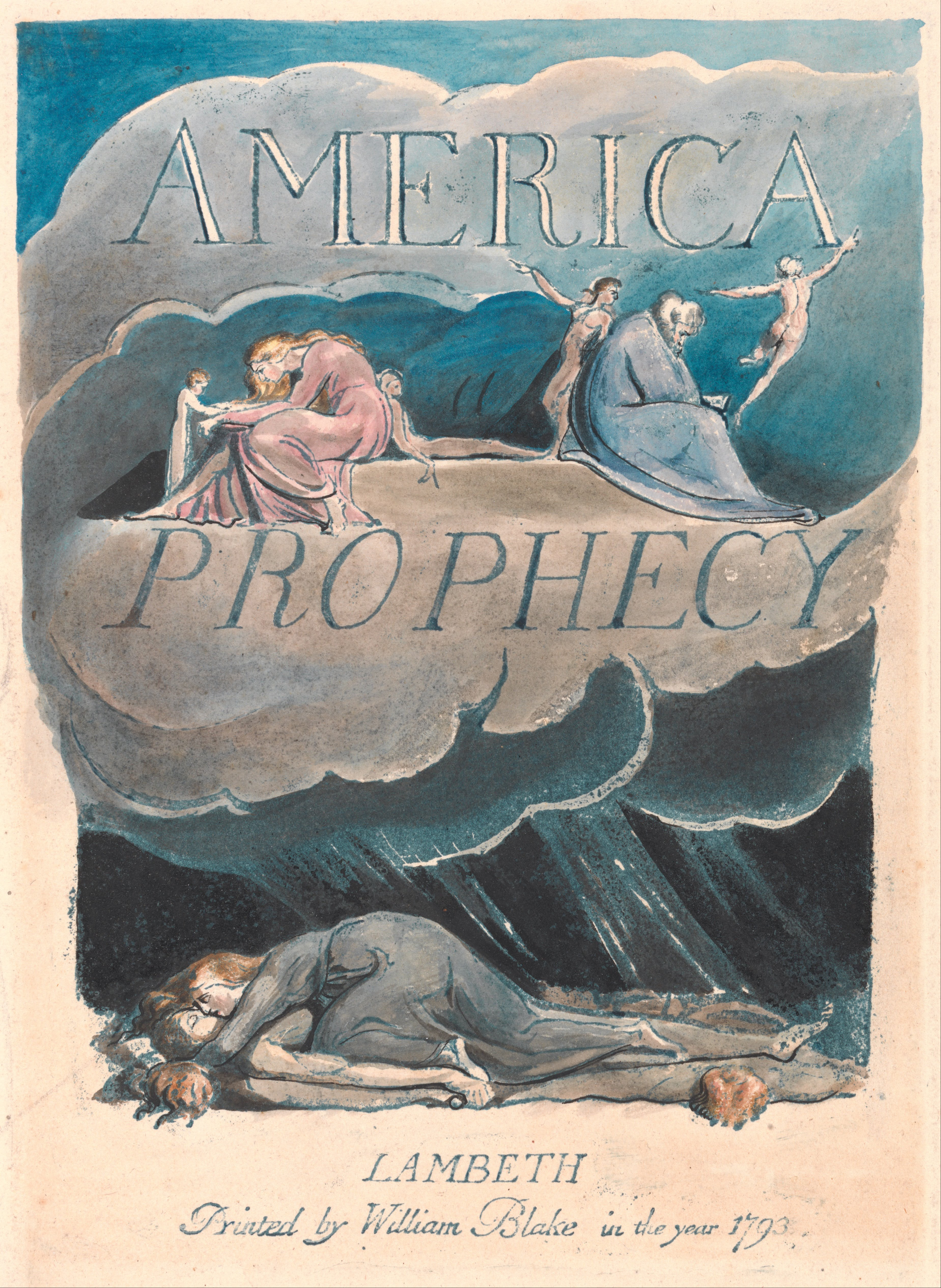 |
| America 3 wiki commons |
PLATE 3
A PROPHECY
The Guardian Prince of Albion burns in his nightly tent,
Sullen fires across the Atlantic glow to America's shore:
Piercing the souls of warlike men, who rise in silent night,
Washington, Franklin, Paine & Warren, Gates, Hancock & Green;
Meet on the coast glowing with blood from Albions fiery Prince.
Washington spoke; Friends of America look over the Atlantic sea;
A bended bow is lifted in heaven, & a heavy iron chain
Descends link by link from Albions cliffs across the sea to bind
Brothers & sons of America, till our faces pale and yellow;
Heads deprest, voices weak, eyes downcast, hands work-bruis'd,
Feet bleeding on the sultry sands, and the furrows of the whip
Descend to generations that in future times forget.----
The strong voice ceas'd; for a terrible blast swept over the heaving sea;
Sullen fires across the Atlantic glow to America's shore:
Piercing the souls of warlike men, who rise in silent night,
Washington, Franklin, Paine & Warren, Gates, Hancock & Green;
Meet on the coast glowing with blood from Albions fiery Prince.
Washington spoke; Friends of America look over the Atlantic sea;
A bended bow is lifted in heaven, & a heavy iron chain
Descends link by link from Albions cliffs across the sea to bind
Brothers & sons of America, till our faces pale and yellow;
Heads deprest, voices weak, eyes downcast, hands work-bruis'd,
Feet bleeding on the sultry sands, and the furrows of the whip
Descend to generations that in future times forget.----
The strong voice ceas'd; for a terrible blast swept over the heaving sea;
The eastern cloud rent; on his cliffs stood Albions wrathful Prince
A dragon form clashing his scales at midnight he arose,
And flam'd red meteors round the land of Albion beneath[.]
His voice, his locks, his awful shoulders, and his glowing eye
His voice, his locks, his awful shoulders, and his glowing eye
(Erdman 52)
Text
The 'Guardian Prince of Albion' occurs also at The Song of Los. You may assume that it refers to the King of England (in a veiled way).
He burns at the 'sullen fires' of America. What might these sullen fires mean? Perhaps at the revolutionary fervor in America.
The 'warlike men: Washington, Franklin, Paine & Warren, Gates, Hancock & Green (probably meant Greene);We might wonder if Blake primarily knew these historical figures re the American Revolution. The one he was most familiar with was Paine.
Washington speaks explicating the oppression America has suffered from Albion.
The statement elicits the fury of the Prince of Albion in dragon form.
About the Image
Note the words in the Title:
America: straight up and down;
a Prophecy: slanted.
Note the upper and lower portions: Lightness above (Erdman calls it the 'mental realm').
In the Lightness between the two words of the title are what Erdman calls two philosophers.
I see America on the left and the Prince of Albion on the right.
The left one is bent over reading a book assisted by a childlike figure.
The right one is also bent over and two angels above him point to AMERICA.
Below is a black area, a battlefield; a dead soldier still holding his sword and a women on him (expecting her kiss will revive him), but there are others lying around, with two severed heads.
Comments
In the 1790's there were many trials for treason in Great Britain
"over thirty radicals were initially arrested and three tried for high treason" Blake produced America a Prophecy expecting to be arrested; he wrote in his notebook "I shan't live five years. and if I live one it will be a Wonder. June 1793"(Erdman, 694) (but he lived another 35 years).
Blake's early draft mentioned King George III by name but not in finished versions.
The Song of Los, America and Europe all describe Africa and Europe; why might that be? "in Biblical and apocalyptic tradition the dragon is defeated by the Messiah"









_Deaths_Door.jpg)








